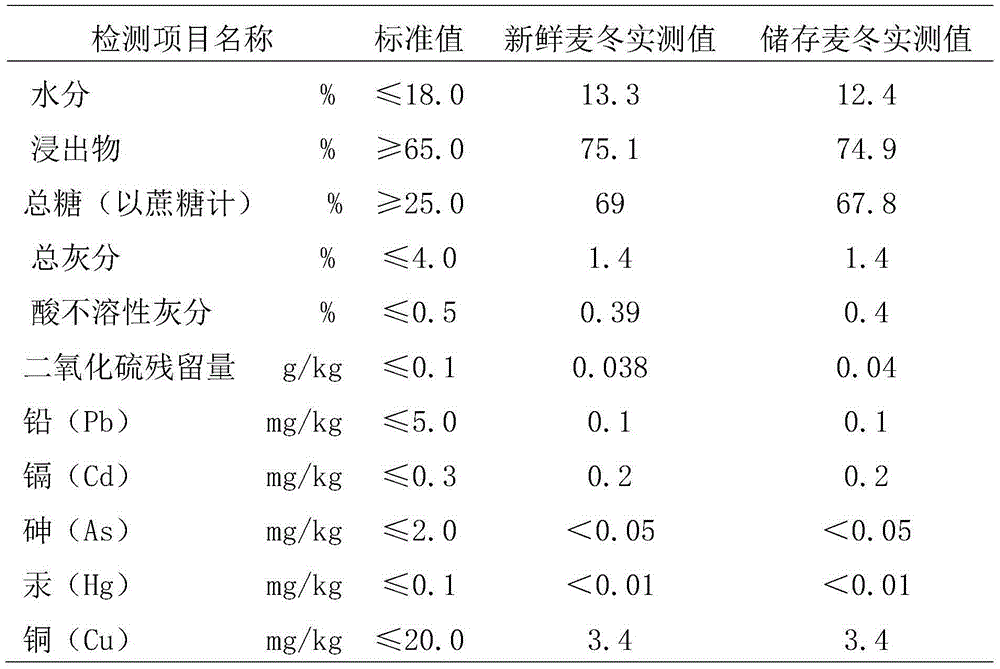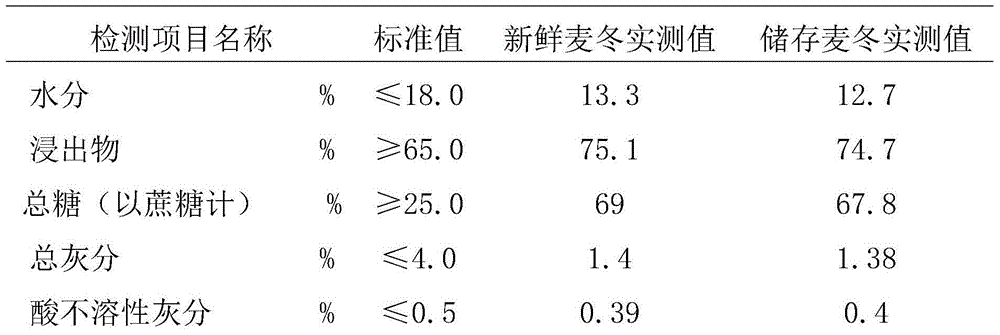Method for storing ophiopogon japonicus
A storage method and technology of Ophiopogon japonicus, which are applied in the fields of botanical equipment and methods, fruit hanging devices, gardening, etc., can solve the problems of darkening of Ophiopogon japonicus, loss of oil consumption, and worms, etc., and achieve a low metabolic rate, The effect of prolonging the shelf life and prolonging the sales period
- Summary
- Abstract
- Description
- Claims
- Application Information
AI Technical Summary
Problems solved by technology
Method used
Image
Examples
Example Embodiment
[0025] Example 1
[0026] A method for storing Ophiopogon japonicus, comprising the following steps:
[0027] (1) Harvest on a sunny day in early and mid-April of the second year after planting Ophiopogon japonicus (from Ching Ming Festival to Grain Rain Festival). Shake off the soil from the roots of Ophiopogon japonicus, and cut off the roots and fibrous roots with scissors. The fine roots at both ends of the root tuber should not exceed 1 cm in length. Put the muddy roots into a basket, wash them in running water, and transport the washed roots back.
[0028] (2) Put Ophiopogon japonicus in the Ophiopogon japonicus dryer. The Ophiopogon japonicus dryer is airtight and can automatically adjust the temperature and humidity in the drying room. Set the temperature of the dryer to 35°C and the humidity to 30%, the dryer mode is set to strong wind, bake for 4 hours.
[0029] (3) Reset the temperature of the dryer to 43°C and the humidity to 33%. After the temperature and humi...
Example Embodiment
[0037] Example 2
[0038] A method for storing Ophiopogon japonicus, comprising the following steps:
[0039] (1) Harvest on a sunny day in early and mid-April of the second year after planting Ophiopogon japonicus (from Ching Ming Festival to Grain Rain Festival). Shake off the soil from the roots of Ophiopogon japonicus, and cut off the roots and fibrous roots with scissors. The fine roots at both ends of the root tuber should not exceed 1 cm in length. Put the muddy roots into a basket, wash them in running water, and transport the washed roots back.
[0040] (2) Put Ophiopogon japonicus in the Ophiopogon japonicus dryer. The Ophiopogon japonicus dryer is airtight and can automatically adjust the temperature and humidity in the drying room. Set the temperature of the dryer to 30°C and the humidity to 31%, the dryer mode is set to strong wind, bake for 4.5 hours.
[0041] (3) Reset the temperature of the dryer to 40°C and the humidity to 34%. After the temperature and hu...
Example Embodiment
[0050] Example 3
[0051] A method for storing Ophiopogon japonicus, comprising the following steps:
[0052](1) Harvest on a sunny day in early and mid-April of the second year after planting Ophiopogon japonicus (from Ching Ming Festival to Grain Rain Festival). Shake off the soil from the roots of Ophiopogon japonicus, and cut off the roots and fibrous roots with scissors. The fine roots at both ends of the root tuber should not exceed 1 cm in length. Put the muddy roots into a basket, wash them in running water, and transport the washed roots back.
[0053] (2) Put Ophiopogon japonicus in the Ophiopogon japonicus dryer. The Ophiopogon japonicus dryer is airtight and can automatically adjust the temperature and humidity in the drying room. Set the temperature of the dryer to 40°C and the humidity to 29%, the dryer mode is set to strong wind, bake for 3.5 hours.
[0054] (3) Reset the temperature of the dryer to 45°C and the humidity to 32%. After the temperature and hum...
PUM
 Login to View More
Login to View More Abstract
Description
Claims
Application Information
 Login to View More
Login to View More - R&D
- Intellectual Property
- Life Sciences
- Materials
- Tech Scout
- Unparalleled Data Quality
- Higher Quality Content
- 60% Fewer Hallucinations
Browse by: Latest US Patents, China's latest patents, Technical Efficacy Thesaurus, Application Domain, Technology Topic, Popular Technical Reports.
© 2025 PatSnap. All rights reserved.Legal|Privacy policy|Modern Slavery Act Transparency Statement|Sitemap|About US| Contact US: help@patsnap.com



